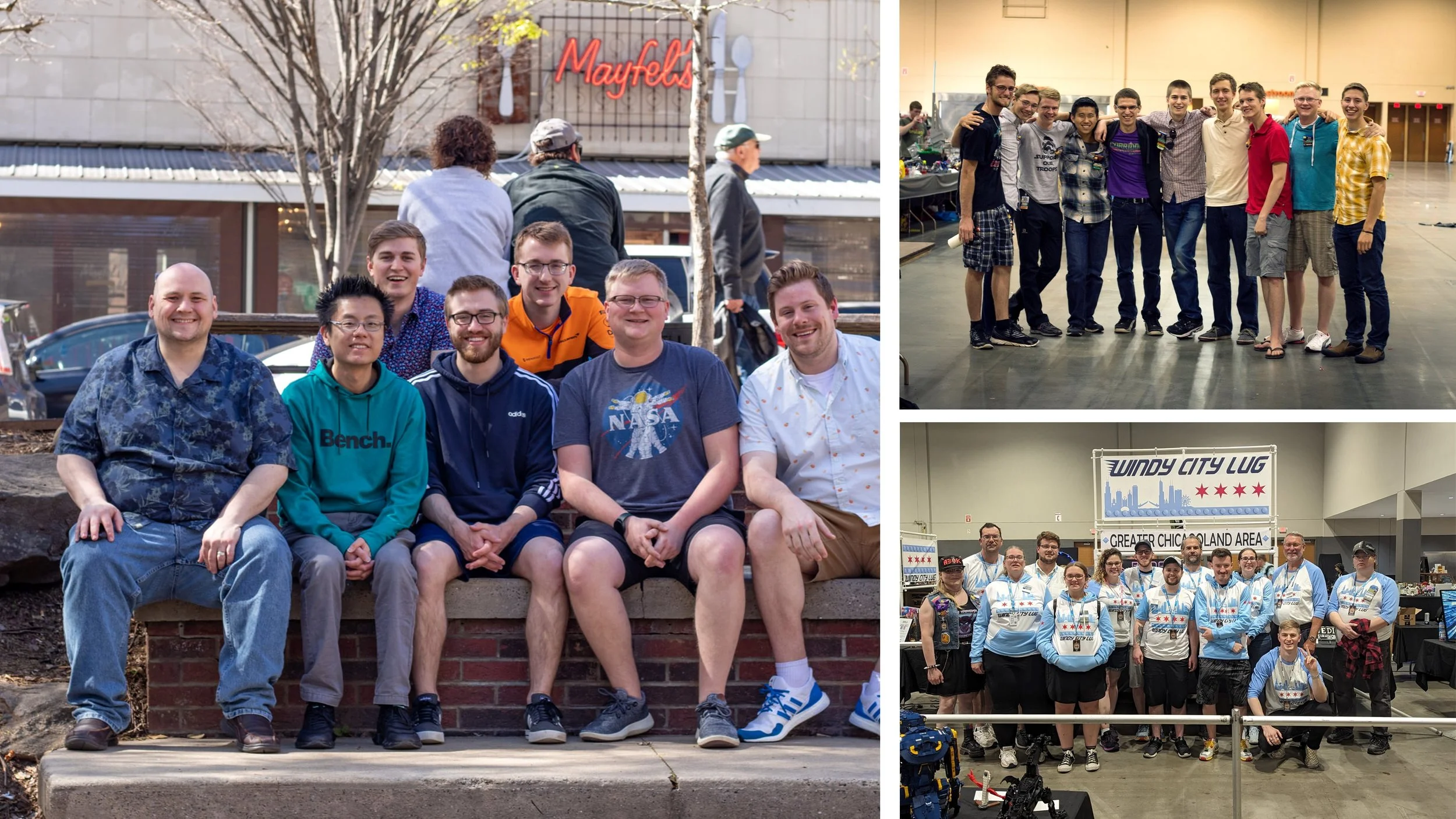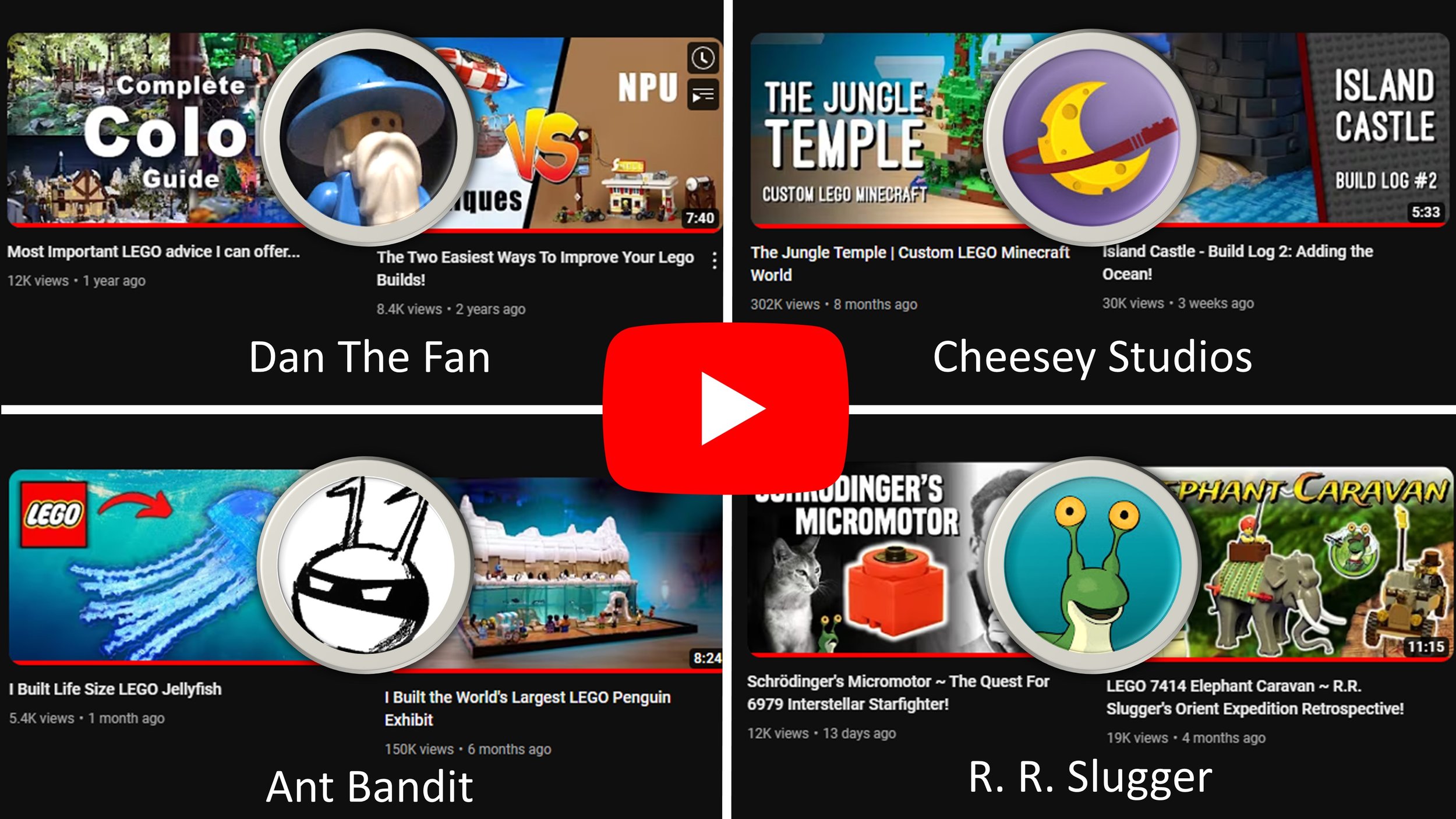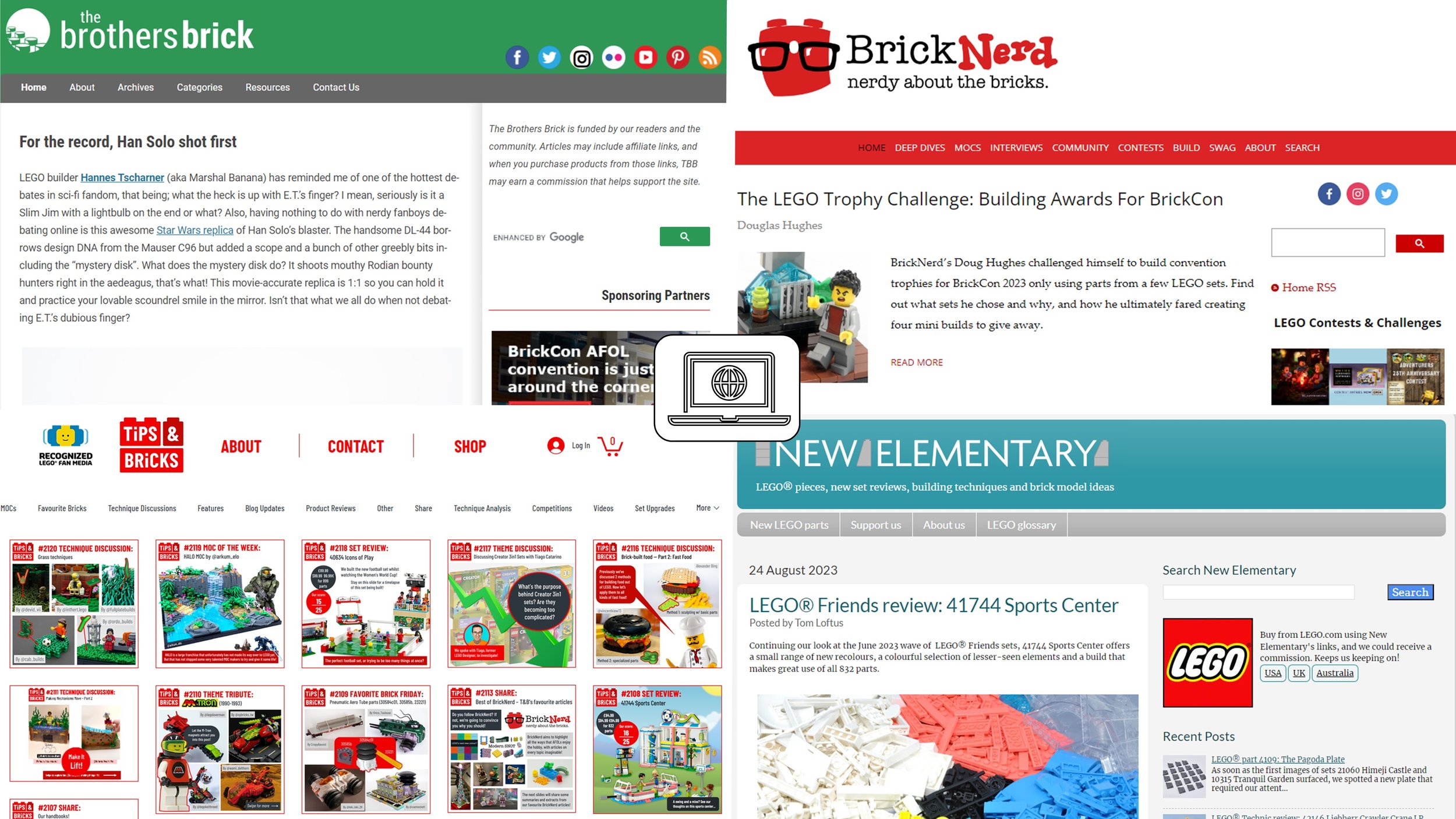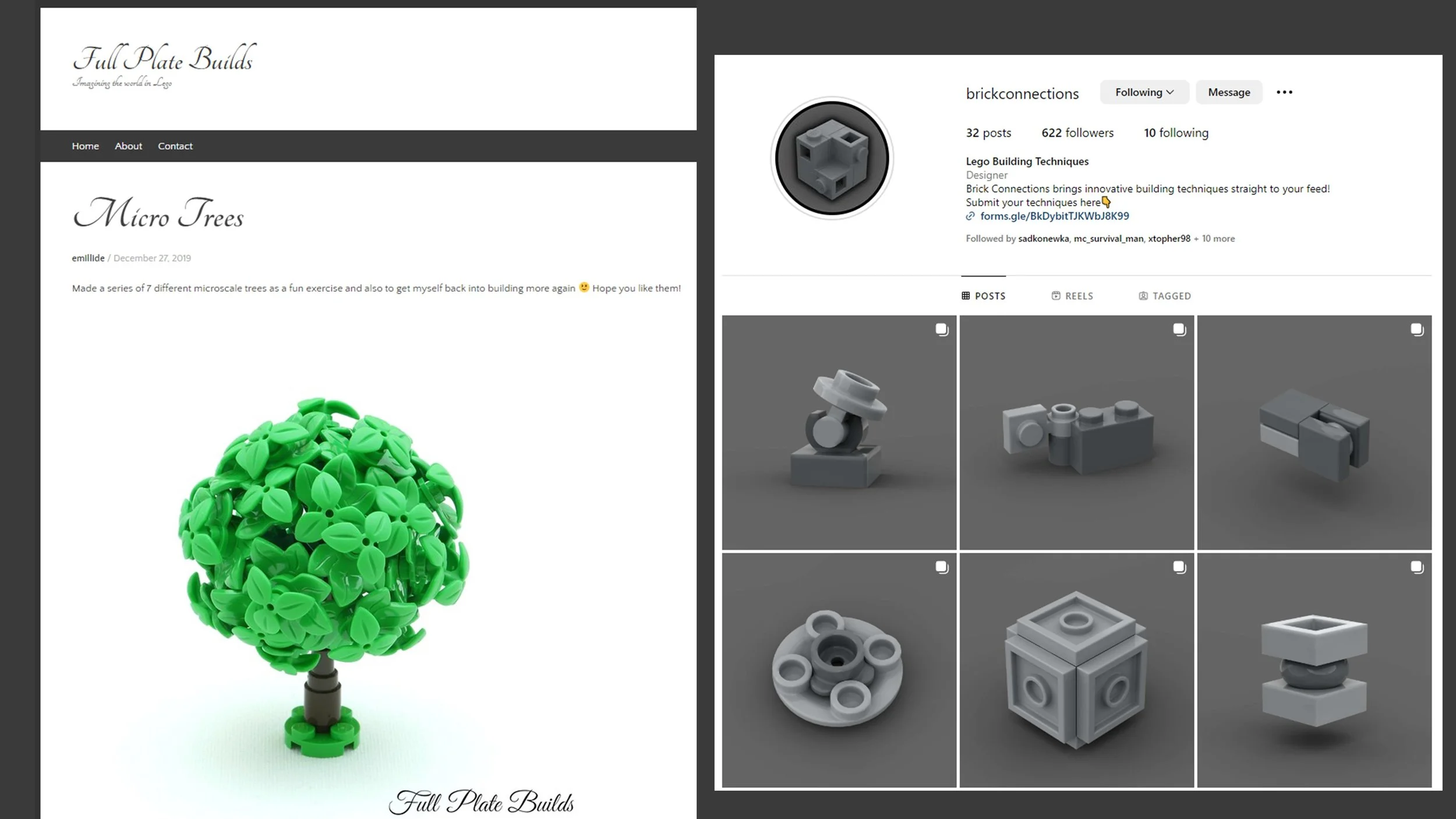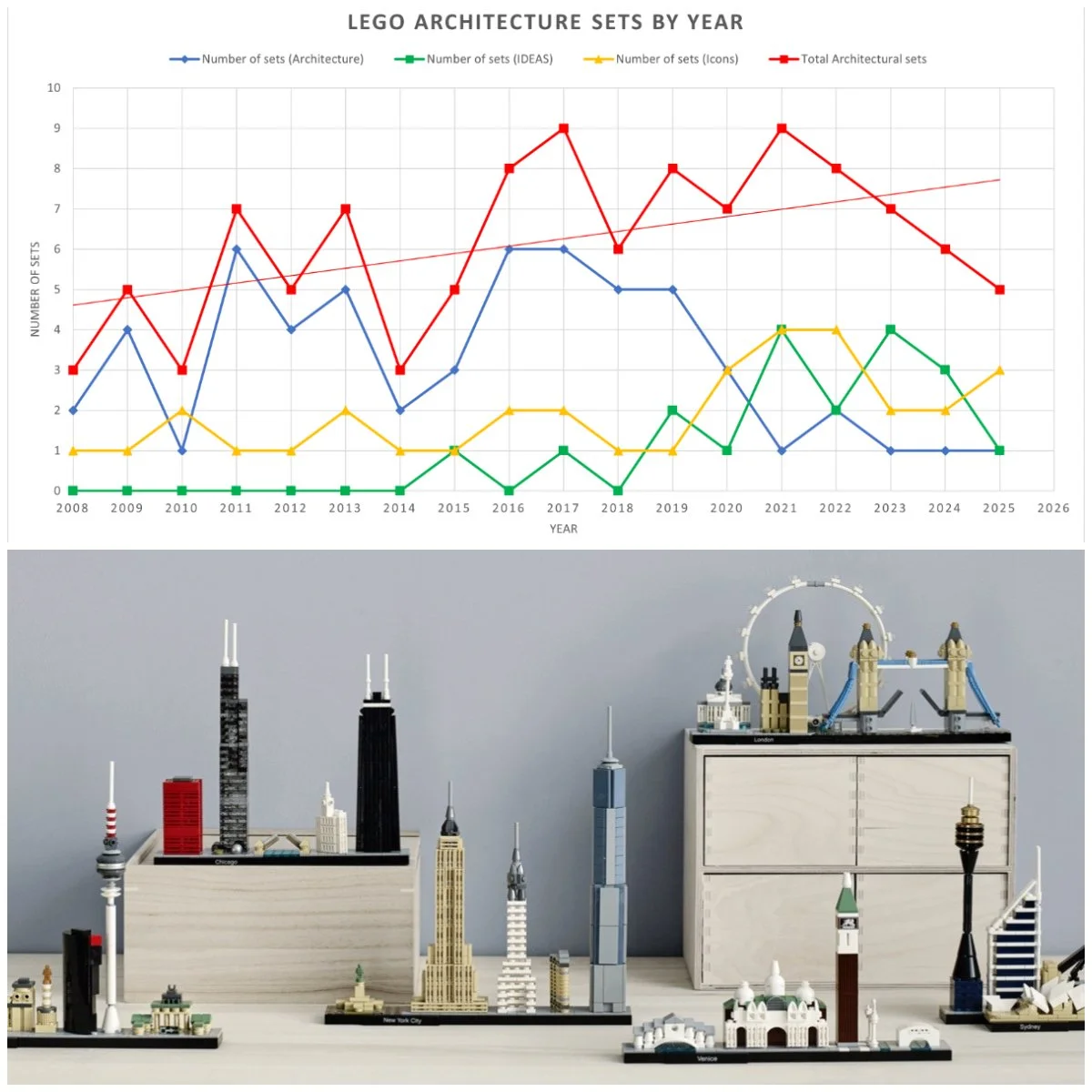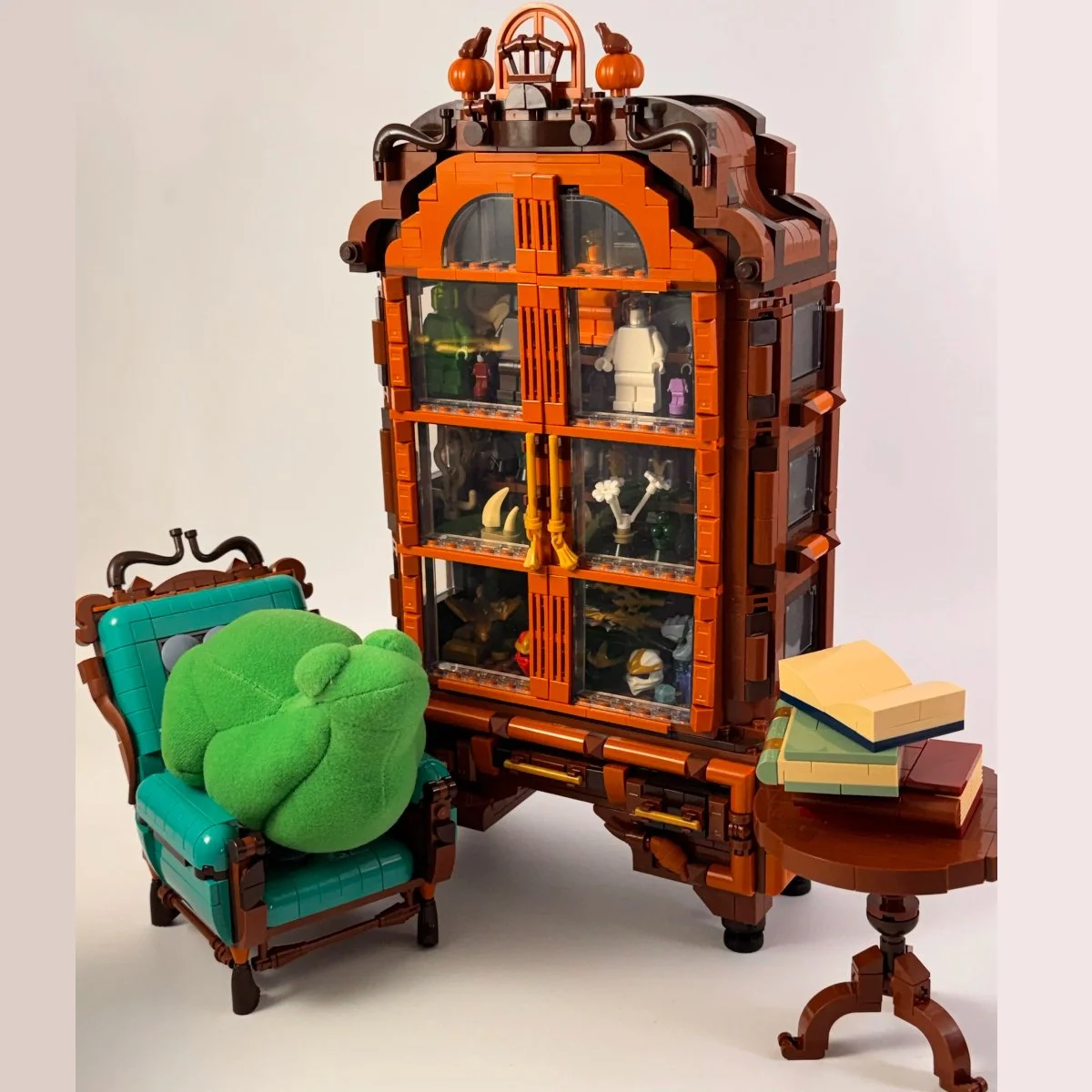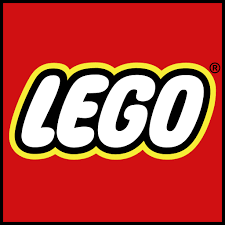How to Become a Better Builder
/Today’s guest article about builder’s block comes from Casey McCoy, an AFOL from Chicago. You can find him online on Flickr and Instagram.
My LEGO Story
I have been building with LEGO for… forever. I can’t tell you a time I didn’t have LEGO in my life. With two older LEGO siblings, I grew up on a steady diet of DUPLO and transitioned to LEGO at a ripe age. Around age 12-13, I was introduced to the online LEGO community when my older brother found BZPower. That led me to find Brickshelf, MOCpages, Brickworld, and be inspired to build my own MOCs.
Can’t say I’ve kept the affinity for brownie batter later in life…
During this formative time, I made wonderful friends online and in person who were excellent at building with LEGO, many of whom I am still close with to this day. But there was a difference. From 2011 to 2018, I did not have a single static LEGO convention nomination or win to my name while I watched all my friends continue to excel effortlessly (as it appeared to me). It sucked. LEGO, like many things in life, did not come naturally to me.
When you’re the only “MOC-building person” to your friends and family, everyone assumes that you must be some sort of LEGO superstar. But like a small-town all-star quarterback going to a D1 college, once you go to a convention with the best talent the AFOL world has to offer, you quickly realize your place.
In 2019, I hit rock bottom in many aspects of life. Once I started formulating how to piece my life back together, I made a commitment that part of me turning my life around would be to become like my peers: actually good at building with LEGO. I was simply not applying myself.
Now, five years later, I have everything I could have asked for, after a lot of studying, building, sacrificing, and trying to answer, “How the heck do I actually become good at LEGO?” And now, I would like to tell you what I’ve learned and what I would tell myself back in 2019.
The following series of tips and advice are predicated on my own unique life circumstances which led me to present this information that benefited me as an individual. No one died and made me the pope of LEGO. Some of it may resonate with you, some of it may not. Just glean from it what you can. After all, there’s a phrase that goes, “All advice is bad advice. If you followed your own advice, you wouldn’t be where you are today.” Is that true? I’m not sure, I just saw it in an R.R. Slugger video. Point being, you’ve been advised.
Humble Yourself: You Actually Know Nothing
This is the most important point. Someone who doesn’t think they have anything to learn cannot be taught.
As I had alluded to in my story, I had this perception that I must have been very good at building because I had many non-AFOLs in my life who were graciously, but naively, gassing me up - only to go to a convention and get served humble pie by the awards committee.
It may sound ridiculous to say for a hobby surrounding a children’s building toy, but I’ve certainly met many people who could benefit from remembering that no matter how many trophies you get, accolades you receive, or titles you win, everyone always has something new to learn no matter how “good” you are or think you are. There are always new techniques, new builders, new genres, new pieces, etc., and something you can learn.
Remember you’re playing with a plastic toy for children!
Be Your Own Worst Critic
Without an inner critique, you will not be able to know how to pivot and adjust a MOC mid-build. After you finish a MOC, get a little time away from it, then return and ask yourself, “What was done well? What do I like about this build?”
Once you glean all the positives from said build, ask:
“In what ways did I fail to achieve the original vision? Why?”
“What could have been improved?” Technique, composition, or color choices?”
“What areas do not work? Is there not enough textural contrast? Color emphasis?”
Once this inner review process is intrinsic to your overall creative process, you’ll be able to apply it in the moment while building and correct as needed. Let’s walk through an example where I will critique my own creation.
I had the rubber bumpers from 7780 The Batboat: Hunt for Killer Croc and saw it used cleverly in MOCs in the past so I wanted to join in on the fun. However, the way that it's used here leaves this awkward, empty ledge between the black border and the rest of the vignette. While I recognized this, too much laziness led me to not try to solve it. I think I’d prefer it to be flush with the rest of the scene.
I find the blank spaces on the walls boring. There’s nothing complex or interesting about them. While I think they provide some brief visual reprieve from the rest of the scene, which can be visually dense, I simply struggled to find a better, more creative solution.
The rug was phoned in. Once again, I had seen cheese slopes used in this way, and I wanted to join in. But I got lazy and did not follow the LEGO math as well as I should have, and I think the resulting pattern is just ‘meh’ and could have been better.
We are often our own harshest critics, so it’s important to try and strike a balance between self-criticism and self-love. But if you never even dip your toe into the former, you won’t be able to swim in the sea of growth.
Invite and Receive Criticism
Once you’ve looked within for improvement, it’s time to turn outward and gain insight from other builders. Getting thoughts and opinions from the broader LEGO community, especially those that have built longer at a higher skill level, can be really helpful. If you want to, you can ask for constructive criticism in the description/comments of your post online or ask a builder in person.
When you do so, it’s important that you set aside your ego and personal feelings about the build (remember to stay humble). If you want to get better, you have to be objective and not let your emotions take over. Once you receive constructive criticism, take mental (or actual) notes of the principles or lessons and apply them in the next relevant building session.
You may run into the occasional comment that is not positive or unconstructive. Those aren’t fun to get. I have a distinct memory of receiving some uninvited criticism in person at a show in 2017. It happens. I can look back and laugh, take the criticism in the spirit in which it was given, and move on.
How to Give Constructive Criticism
Let’s do a brief aside on how to give helpful constructive criticism. My favorite way of giving constructive criticism is using the compliment sandwich. You sandwich the critique in between two positive statements. Let’s critique another one of my builds as an example:
Positive 1: “I really love the way you shaped that archway! Looks great.”
Criticism: “One thing: the dark bley on the steps really doesn’t fit with the rest of the build.”
Positive 2: “Just want to say, though, overall, awesome build! Keep it up!”
I’m sure someone has studied the psychological benefits or outcomes of using this method, but this should be obvious: you’re able to provide criticism while still staying positive overall. Let’s review some uninvited criticism I received from a trusted and experienced AFOL friend on this same build during the build process:
What did you notice about his comments? He used the compliment sandwich! Now, did I take his advice? Not this time. Why? Because I’m lazy. I was trying to “flex a technique” and used it poorly, jeopardizing the scaling of the model. And I didn’t want to rip out that portion from the precarious MOC. Instead, I made a mental note that going forward in the future, I need to pay better attention to scale. Thank you, Sam!
Now, not everyone is looking for you to provide constructive criticism. It’s usually best within the LEGO subculture to only provide it when asked. Don’t take this article as a license to go around bashing MOCs all over your timeline.
And on the flip side, if you’re afraid of receiving criticism, I think you may be surprised by the overwhelmingly positive, understanding, and caring nature of most AFOLs. There’s an interesting experiment documented on The Brothers Brick where a builder tried to make “bad” builds and still got positivity. Don’t be scared!
If You Want to Be the Best, You Have to Roll With the Best!
Have you ever heard the phrase, “You are the average of the five people you spend the most time with?” I like to think that the same thing applies to your LEGO building. If you surround yourself with people who are chasing new techniques, experimenting with new parts, and trying to make the next all-time best, jaw-dropping MOCs, you must pick up on something, even simply through osmosis.
You should intentionally surround yourself with the best possible builders, especially if they’re working in the same genre or with similar building styles as you. You can also learn wildly different and new things from builders in wholly opposing building styles as you. Having a diverse set of voices and taking in other builders’ thoughts, opinions, and reactions is invaluable.
How do you find “the best”? Well, you can join a LUG, start a LUG, look online for the best builders in your genre, go to conventions and meet people, join forums, etc. The best are everywhere if you know where to look.
My main circles for continuous improvement include one real LUG, one fake LUG, and a whole lot of random LEGO friends I’ve made throughout the years:
Get a Mentor, aka an “Accountabuildibuddy”
Now you may have a circle or multiple circles of great builders to draw upon. In the same vein, you can ask someone with experience, who has the skill, and who you trust to be your accountabuildibuddy! The idea is that the primary function of the relationship is that both parties challenge one another with honest feedback for ongoing build projects. It’s mutually beneficial. Both you and your buddy have frequent check-ins, ask one another for build advice and feedback, and keep building! No AFOL gets left behind!
Mine is the venerable Simon Liu (bet you couldn’t tell after I wrote three articles about him). Here are a few of the messages I’ve plucked from 2019 – 2023 to see instances of me asking for feedback from someone I know will tell me the truth and not sugarcoat it if a part of my build is not working.





If you don’t have a specific individual in mind, getting a group to mentor you is certainly available too. My LUG, WindyCityLUG, has a “Wips ‘N’ Builds” channel which is pretty much dedicated to that. However, there are plenty of online forums or e-LUGs aimed at that end. While I don’t have any personal experience with it, the Builder Improvement Initiative is dedicated to just that and I know the Iron Builder Discord is a great resource for anyone at any skill level to get build feedback. Find a group and get plugged in!
Have a Curious Mind - Constantly Learn!
You are a student of LEGO! Time to hit the books. Here are some of my favorite resources to learn from.
In-Person: Any time you run across a MOC, in-person or online, that speaks to you with its composition, technique, color choice – anything – ask questions! Voraciously learn as much as possible. Attending conventions and LUG presentations is also a great way to learn.
Social Media: Flickr/Instagram have all sorts of things to find through exploring such as:
How-To Posts
Technique Behind the Scenes
Build Logs/WIP Journals
YouTube has millions of channels, so I’d like to highlight some of my favorite LEGO channels:
Dan the Fan – Dan has brilliant videos, but my favorites are on tree techniques and color. I swear I’ve watched his color video five times. Dan’s currently away on a missionary trip, but I eagerly await his return!
Cheesey Studios – Caleb primarily builds Minecraft, which is not a theme I build in, but his high-quality videography and explanations behind his creative process are valuable insights.
Ant Bandit – Adam’s videos on creating his MOCs are similar to Caleb’s and made with top-notch production. Not a lot of uploads, but I look forward to more in the future.
R.R. Slugger – Slugger primarily covers retro sets but is always sure to highlight any old pieces, rare recolors, etc., all the while doing so in a unique authorial voice.
Beyond the Brick – BTB now has over 4,000 videos which serve as a massive MOC archive from builders around the world in any genre that you can think of (e.g., If you’re working on a castle, watch some interviews with castle builders for insights).
Blogs and Online Journals:
The Brothers Brick: This is the creme de la crème of MOC highlights. The best MOCs are posted here for your review and enjoyment!
BrickNerd: Hey, you’re here! I love BrickNerd because it has the most diverse collection of unique authorial voices anywhere in the AFOL space. Read on!
Tips & Bricks: T&B’s output is varied – from set reviews to cultural discussions – but my favorite posts are Favorite Brick Friday and BTS on MOCs, as you can glean tons from them.
New Elementary: The folks at NE are doing the best parts of journalism in the LEGO space by keeping us up to date with all the new releases, recolors, and PAB availability. It's insane to think you can just read that website for free!
Magazines and Books:
I’m less familiar with magazines. I started out with a subscription to BrickJournal when I first started as a TFOL, but I know other publications like Brick Fanatics, Blocks, and HispaBrick also do a great job at sharing information and news.
There are a few publishers out there but no one really does it better than No Starch Press for AFOL resources. Some of my favorite books include The LEGO Animation Book by Dave Pickett and Dave Pagano, Beautiful LEGO by Mike Doyle, and The Unofficial LEGO Technic Builder’s Guide by Pawel “Sariel” Kmiec. They have over 30 titles, including a new LEGO Builder’s Handbook.
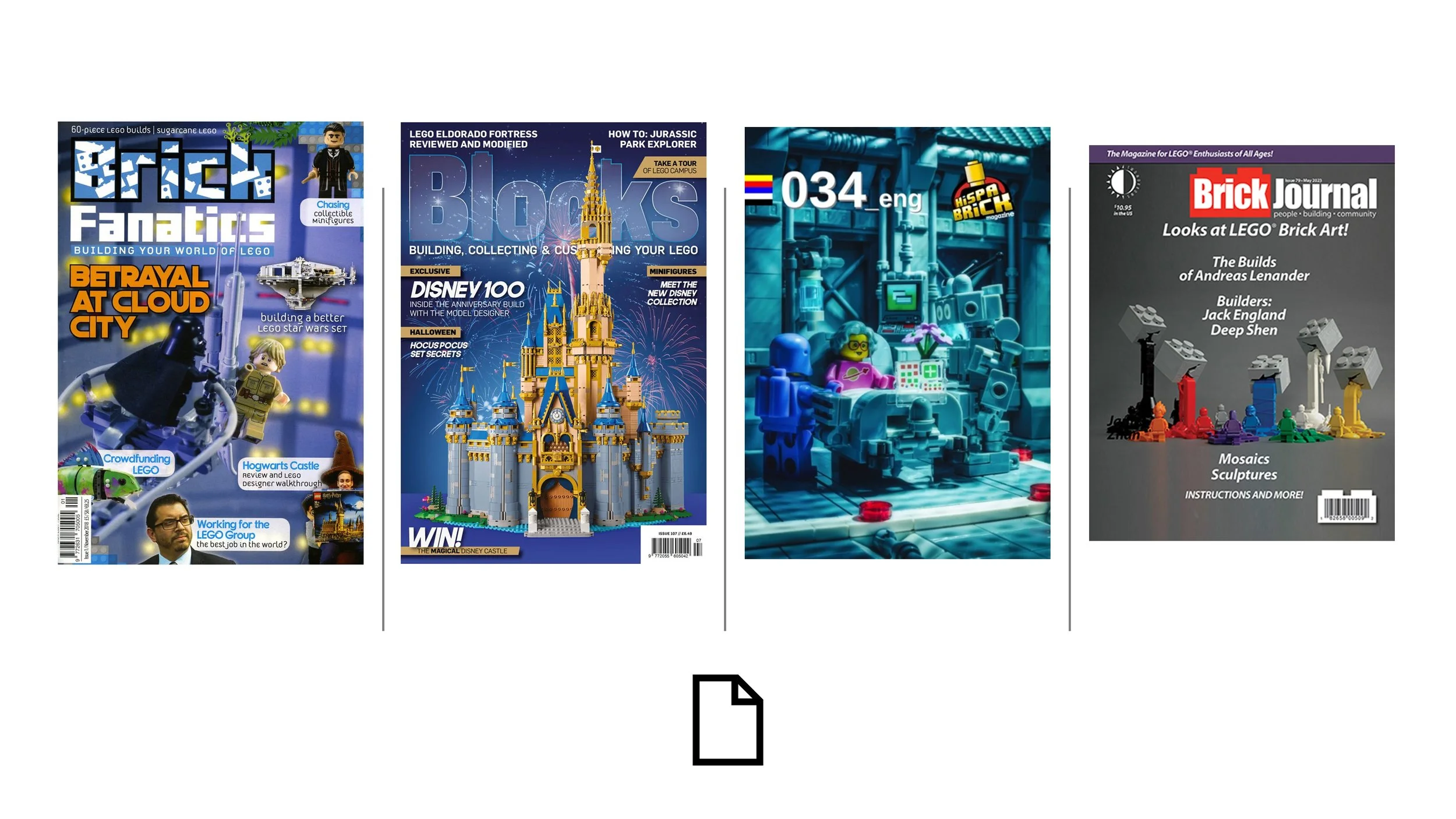
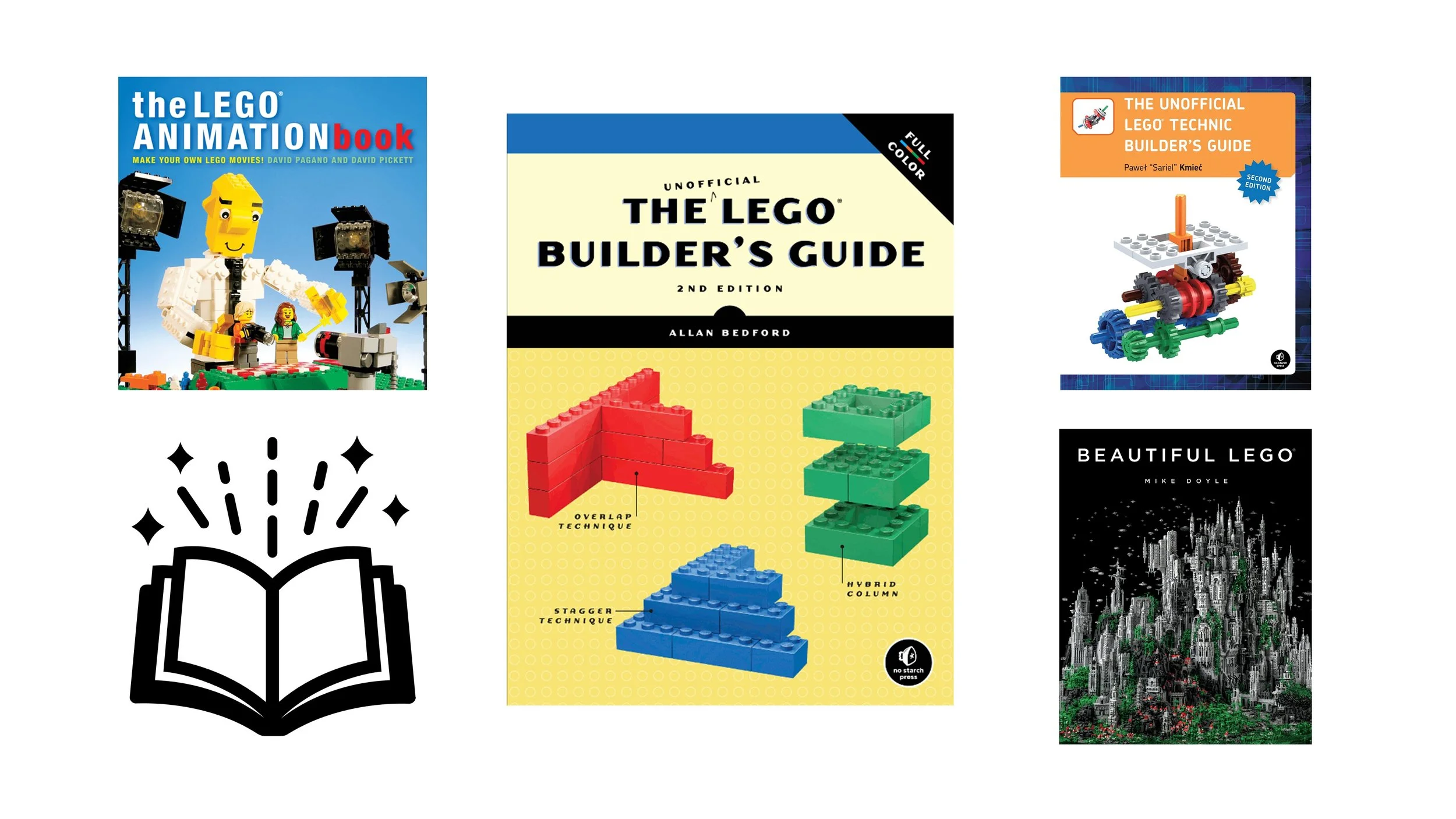
There is so much to learn from the AFOL world. This brief list of my favorite sources really just scratches the surface. If you were studying for a graduate degree in LEGO building, how would you approach it? Go out there, be curious, and learn!
Learn New Build Techniques
A build technique is a unique way in which two or more LEGO elements interact with each other to perform a function - aesthetic or mechanical. Of all the tips I’ve shared thus far, I honestly think this one will give you the most in return for your time investment. It’s not hard or difficult to implement a new technique over a lifetime once you learn it. And any time you learn a new technique, it’s like peeling back another layer on the mysterious onion that is the LEGO system (mmm 🤤 onions).
There are a lot of places to learn techniques, many of which we just covered above. However, some specific builders will share behind-the-scenes info on their social media pages. There will be specific articles dedicated to use cases or other specific websites dedicated to sharing LEGO techniques. An internet query of “_____ LEGO Technique” should yield some great results in any case. I try to challenge myself by incorporating one new technique into every new build so my “toolkit” keeps on expanding.
SNOT: The Single Most Important “Technique”
A fundamental and internalized understanding of SNOT (Studs Not On Top) is the only way to achieve shaping that otherwise wouldn’t be possible in the LEGO system. The topic itself is so infinitely complex, BrickNerd has many dedicated articles just to exploring the concept and probably more on the way (which are, for my money, some of the most useful LEGO-related articles ever published on the internet). If you have not yet built a modern-day Speed Champions set, crack one open, build it, and you will quickly be blown away by the versatility and utility that SNOT can provide.
The Best Artists Steal*
If you come across something that is already perfect and brilliant, do not reinvent the wheel. When you see something that inspires you and could be of use, “steal” the technique. It should go without saying, but stealing whole MOCs or taking credit for something you discovered by someone else is bad. My thoughts on the matter are that it’s perfectly fine to take something you glean from others, provided that you cite your sources and refrain from any kind of stolen valor.
Below are a few examples where I’ve done just that:
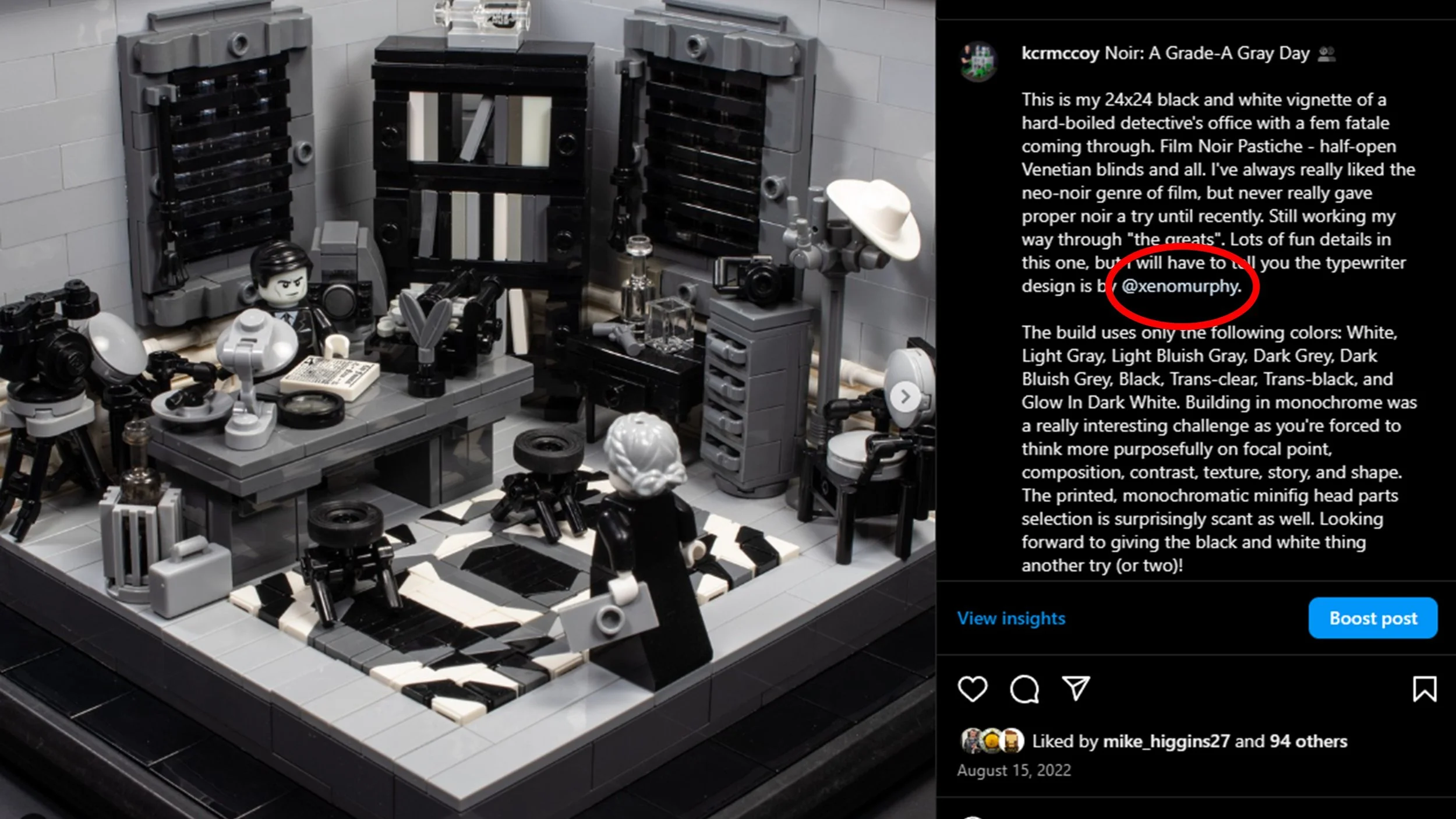
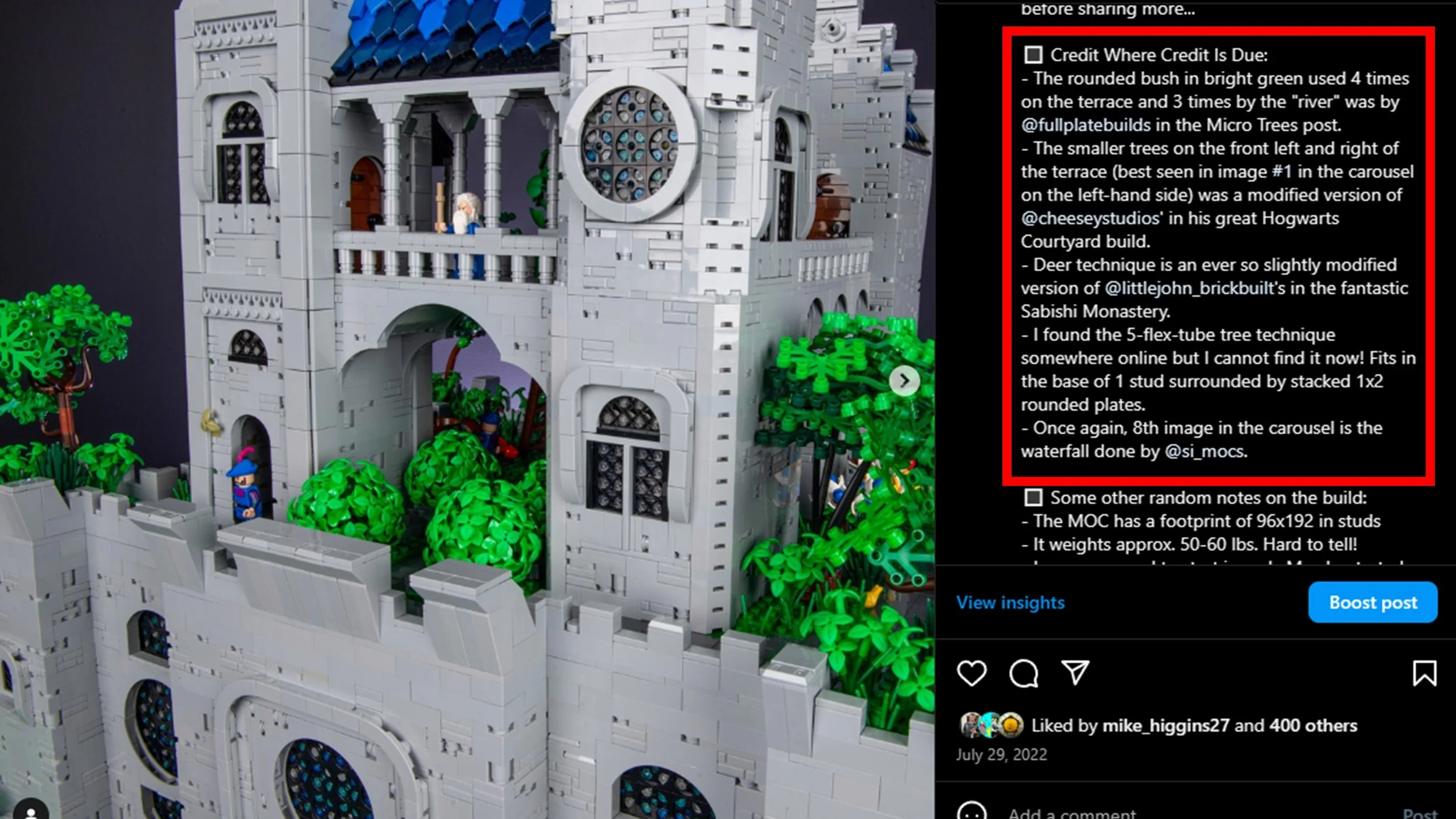
Xenomurphey’s Typewriter in my above-mentioned “Noir: A Grade-A Gray Day”
Monastery: Tree Technique by Caleb Schilling, Tree Technique by Full Plate Builds, & Deer by John Snyder
*It should go without saying, but stealing whole MOCs or taking credit for something you discovered by someone else is bad. :(
Build What You Love and Build Often
If you don't like or enjoy what you’re building, why do it at all? I know this article explored very pragmatic ways to improve, but if the core of what you’re doing doesn’t revolve around celebrating fun and creativity, it’s all a wash.
When I’m building what I love and am passionate about, it gets me excited to build consistently. And when I build consistently, I get into a “creative flow state” where each successive build is better than the last as I’m actively “building” on what came before. When possible, try and avoid “on again off again” building sessions that span months. This can be helped if you’re building things that you’re passionate about as it’ll come easier. Building is supposed to be fun. If it’s not fun, why do it?
With Every Progressive Step, Double Down
Once you accomplish one goal, it’s time to set a new one. Once you get comfortable, it’s time to step outside your comfort zone and push ahead. Ask broadly: what’s next?
If you’ve never built in the space genre before, it’s time to make a spaceship!
If you’ve never interacted with AFOLs in real life, it’s time to attend your first convention!
If you were nominated for an award at a convention but didn’t win, it’s time to figure out what it takes to snatch the win next time!
These goals should be personal to you and based on what excites you to build with LEGO and express your creativity.
You Can Accomplish A Lot in Very Little Time
As we start to close, let’s take a look at this retrospective post from Josiah from 2012 and 2014 to inspire you:
I think the image and caption say it all in how much this builder progressed quite rapidly in their skill set. When comparing two very similar MOCs in subject matter, everything from composition, technique, detailing, color gradients, photography, photo editing, and presentation all vastly improved. Improving is easier than you think, but it does take a lot of work (if you’re not a natural)!
Being a Better Builder
And that’s where we’ll leave it. Hopefully, these tips will help you on your journey to becoming a better LEGO builder!
Best of BrickNerd - Article originally published November 18, 2024.
What do you think it takes to become a better builder? Let us know in the comments below!
Do you want to help BrickNerd continue publishing articles like this one? Become a top patron like Marc & Liz Puleo, Paige Mueller, Rob Klingberg from Brickstuff, John & Joshua Hanlon from Beyond the Brick, Megan Lum, Andy Price, Lukas Kurth from StoneWars, Wayne Tyler, Dan Church, and Roxanne Baxter to show your support, get early access, exclusive swag and more.









